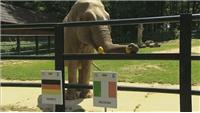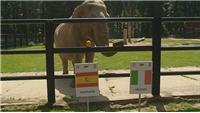
FRANKFURT, Germany (AP)—When Germany won its first major title in women’s soccer, coming home with the trophy from the 1989 European Championship, the players’ bonus was a coffee set. A tacky one to boot, with a design of red and blue blooming flowers—and a flaw.
The discount, second-choice product from a local manufacturer may have been a poor pick for a gift, but consider that this was the same German federation that had banned organized women’s soccer between 1955 and 1970.
The women’s game has come long way since its pioneer days. Should Germany win the Women’s World Cup, the players will be able to buy any tea set they want — and then some—with their bonuses of $85,410 each.
“The World Cup will give women’s soccer a new dimension,” says Katja Kraus, a former Germany goalkeeper who has risen to top management levels in the men’s Bundesliga.
Germany will be trying to become the first team to win three straight World Cups when it kicks off the three-week tournament against Canada on Sunday in Berlin’s Olympic stadium. The tournament will be held in nine cities across Germany, with the July 17 final in Frankfurt.
“This is going to be a great event to rival and maybe surpass the 1999 spectacle. We all know that was an awesome and competitive spectacle of women’s athletics,” said ESPN analyst Tony DiCicco, who witnessed the sold-out stadiums and enthusiasm first-hand as the U.S. coach in 1999. “We have great teams— three of my personal favorites are the U.S., Germany and Brazil—and we have great players.
“We’ve got the most prepared teams probably in the history of the Women’s World Cup from top to bottom,” he added. “There’s going to be a couple of lopsided games but, overall, I think this is going to be the most engaging competition as far as the World Cup (ever).”
The 2006 men’s World Cup in Germany is now known as the “summer fairy tale” for its fabulous weather, huge and generally well-behaved crowds that turned the tournament into a monthlong party. German organizers are trying to reproduce that atmosphere, and the strong marketing effort has sold 75 percent of the 900,000 tickets for the 32-game tournament.
Aside from Berlin, which will host only the opening match, the only other 2006 World Cup arena to be used is in Frankfurt. Most other stadiums have a capacity of between 20,000 and 30,000.
The tournament will also have unprecedented television coverage both in Germany and the United States. All 32 games will be shown live in Germany by the country’s two public television channels. ESPN is giving the Women’s World Cup the same kind of treatment it did last year’s men’s tournament in South Africa, showing all 32 games live on either ESPN or ESPN2, as well as online at ESPN3.com.
ESPN also created a mobile studio, “Big Blue,” that will allow the network to do live pregame, postgame and halftime shows from the different stadiums, along with showcasing cultural sites throughout Germany.
“We will cover the tournament as a tournament unto itself,” said Jed Drake, executive producer of ESPN’s World Cup coverage. “But we will recognize the importance of the U.S. team to our audience, and pay extra attention to them. … I do believe that the interest in the U.S. team is going to generate a lot of interest, and we’re starting to feel that buzz now.”
The Americans come into the World Cup as the top-ranked team in the world and defending Olympic champions. But it’s been 12 years since the “Golden Generation”—Mia Hamm, Julie Foudy, Joy Fawcett, Kristine Lilly and Brandi Chastain, just to name a few—won the United States’ second title, and the Americans have been uncharacteristically inconsistent of late.
After going more than two years without a loss, the U.S. dropped three games in five months. The Americans were stunned in the semifinals of regional World Cup qualifying by Mexico, a team that had been 0-24-1 against its northern neighbor. The U.S. had to win a home-and-home playoff with Italy just to get to Germany.
The United States lost to Sweden in the Four Nations opener, though it did go on to win the tournament, and then was beaten by England for the first time since 1988.
“That’s a sign of how strong the sport has become,” said captain Christie Rampone, the only current player left from the ’99 squad. “International teams have more money invested and more of a commitment to women’s soccer. “There’s not a team out there you can overlook.”
Germany has lost just three games since February 2009—though all three were to the Americans—and looks particularly potent after spending more than two months in training camps. Coach Silvia Neid’s team played four warm-up games and won them all, scoring a combined 15 goals and conceding none. That’s not surprising, seeing that Germany won the title four years ago in China without conceding a goal.
Brazil, runner-up at the last two Olympics and the 2007 World Cup, is unbeaten since April 2009 and has Marta, the five-time FIFA player of the year.
“It’s very important because I’ve won individual titles,” Marta said of winning the World Cup. “Now I want to get a team medal, not just for me, but for the entire team, the athletes, the coaches and everyone. And for Brazil.”
The U.S. could see Brazil as early as the quarterfinals, and a showdown with Germany looms in the semifinals. While those three teams are the heavy favorites, Foudy said there are others to watch. England has impressive depth led by Kelly Smith, part of FIFA’s All-Star team at the 2007 World Cup. France has 10 players from Lyon, which just won the women’s version of the Champions League. Canada was the top team in CONCACAF qualifying, scoring 17 goals and conceding none as it won all five of its games.
But France and Canada are in the same group as Germany, along with Nigeria. The United States also has a tough draw, facing North Korea in the first round for a fourth straight World Cup along with Sweden and Colombia.
England is in Group B with Japan, New Zealand and Mexico. Brazil has Norway, Australia and Equatorial Guinea in Group D.
- Arbeloa: Spain must never change their style
- Wedding bells turn Iniesta's legs to jelly
- Pele: Brazil's 1970 World Cup winners better than Spain
- Pirlo: Only Spain are superior to Italy
- Spain disproved boring tag with empathic final win, insists Alonso
- Fernando Torres revels in Euro 2012 crown
- Italy can reach the final at World Cup 2014
- Johan Cruyff: I enjoyed Italy and I'm a big fan of Del Bosque's Spain
- De Gea & Mata named in Olympics squad
- Shevchenko: Euro 2012 was a success for Ukraine
Hot News
- Funny Balotelli!
- Spanish fans celebrate Euro Cup win
- That's German WAGS!
- The sexy female fans in Euro 2012
- Euro 2012: Spain fans celebrate victory
- Spain vs Italy in clash of the Euro WAGs
- Euro 2012 Final - Spain 4 : 0 Italy, Part 2
- Germany knocked out by Italy
- Natalia Siwiec blasts Sol and the BBC
- Coleen Rooney reveals her bikini body secrets
- Italy's fans celebrated wildly
- Euro 2012 Final - Spain 4 : 0 Italy, Part 1
| Rank | Team | W/D/L | Pts |
|---|
Cities & Stadiums
The Top 3 Teams of Previous Tournaments
| Year | Winners | Runner-up | Third place |
|---|---|---|---|
| 2008 | Spain | Germany | Russia / Turkey |
| 2004 | Greece | Portugal | Netherlands / Czech Republic |
| 2000 | France | Italy | Netherlands / Portugal |
| 1996 | Germany | Czech Republic | France / England |
| 1992 | Denmark | Germany | Netherlands / Sweden |
| 1988 | Netherlands | Soviet Union | Italy / West Germany |
| 1984 | France | Spain | Denmark / Portugal |
| 1980 | West Germany | Belgium | Czechoslovakia |
| 1976 | Czechoslovakia | West Germany | Netherlands |
| 1972 | West Germany | Soviet Union | Belgium |
| 1968 | Italy | Yugoslavia | England |
| 1964 | Spain | Soviet Union | Hungary |
| 1960 | Soviet Union | Yugoslavia | Czechoslovakia |




